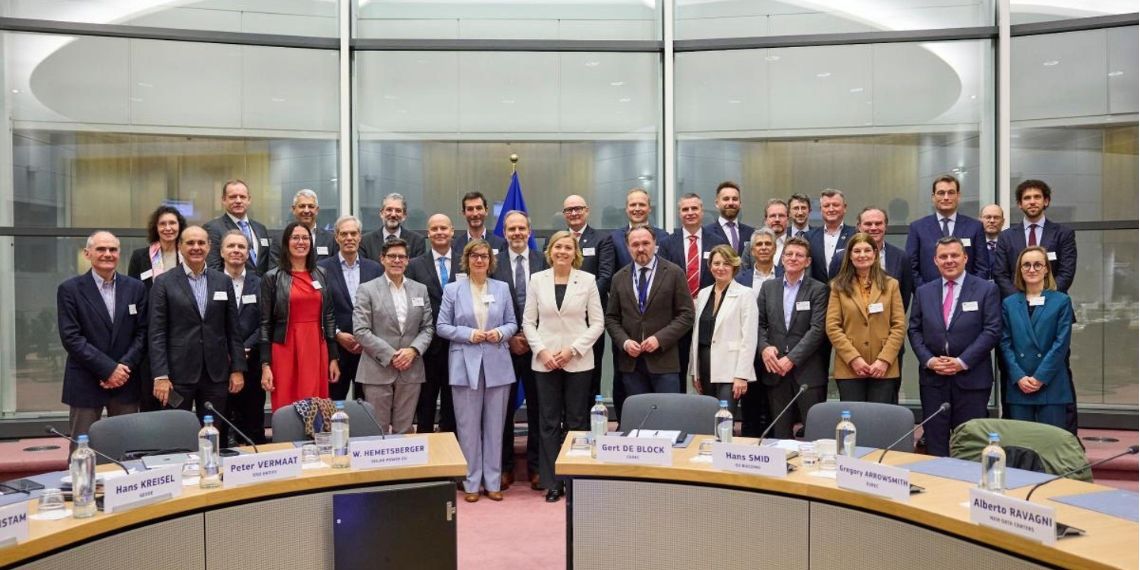In a European context characterised by the urgency of the energy transition and the need to guarantee the security, resilience and efficiency of the energy system, INESC TEC continues to reinforce the commitment to supporting the definition of public policies for the use of Artificial Intelligence (AI) in this field, contributing with technical expertise and applied research experience. In this sense, João Claro, Chairman of INESC TEC, took part as a speaker at a high-level event on AI and energy organised by the European Commission on 19 November, in Brussels. The event aimed to prepare the strategic roadmap for digitalisation and use of AI in the energy system.
How can AI predict and prevent failures in the pwoer grid? Will it make the European system more efficient and resilient? How can we ensure there is enough energy to power increasingly demanding AI models in a sustainable way? And how can we make sure the energy systems themselves evolve to support the fast evolution of AI applications? These were some of the questions that dominated the meeting, which brought together policymakers, technology companies and energy companies. INESC TEC was the only research organisation invited to discuss both the role of AI in Europe’s digital and energy transition – AI for Energy – and the conditions needed to ensure society has more sustainable AI systems – Energy for AI.
The High-level Event on Artificial Intelligence and Energy opened with Henna Virkkunnen, Executive Vice-President responsible for Technological Sovereignty, Security and Democracy, and Dan Jørgensen, Commissioner for Energy and Housing. Before the panel discussion – which included João Claro – Laura Cozzi from the International Energy Agency (IEA) delivered a keynote presentation.
The debate AI for Energy and Energy for AI focused on two main themes: first, how AI can make the energy system smarter, more predictable and more efficient; and second, how the energy sector should adapt to meet the rapidly growing energy needs associated with AI itself and with the expansion of data centres and digital infrastructures.
The panel, moderated by Mechthild Wörsdörfer, Deputy Director-General at DG ENER, and Roberto Viola from DG CONNECT, included representatives from Elia Group, Data4, Engie Belgium, Schneider Electric, 1KOMMA5º, as well as INESC TEC.
During his intervention, João Claro emphasised that the central question is no longer whether Artificial Intelligence will make the European energy sector smarter and more predictable, but how Europe can guide this transformation in line with climate, industrial and digital ambitions. “Understanding this dual dynamic – AI serving the energy sector and the energy sector serving AI – is essential to ensure a balanced and sustainable transition aligned with European priorities,” he said. If this dynamic is managed with strategy and foresight, the expansion of data centres and AI workloads (that is, the sets of real-time computational processes, applications and resources used to carry out specific AI tasks) should not be perceived as a threat to the grid, but rather as an opportunity to strengthen the integration of renewables and increase system efficiency. Unlike traditional industrial consumption, AI workloads can be shifted in time and space, aligned with the availability of renewables, and adjusted to ease pressure on the system at critical moments.
Accordingly, the INESC TEC Chairman highlighted the work the institution has been carrying out with the Portuguese supercomputer Deucalion, where solutions for local energy production, storage, advanced cooling, more efficient computing and the intelligent coordination between computational needs and energy resources are being implemented as practical examples of this approach.
“At INESC TEC, we are putting this vision into practice by developing solutions and methods that promote a more energy-efficient use of AI systems, both during training and inference phases. But there are still structural challenges, particularly the need for high-quality, diverse and traceable data – vital for building robust foundation models for the energy sector. Collaborative mechanisms that avoid direct data sharing, like those we have developed with Elia Group, and the use of digital twins can help overcome these barriers. This allows collaboration to evolve from data sharing to model sharing, accelerating innovation safely and responsibly,” João Claro explained.
“Artificial Intelligence is not only becoming essential to the modernisation of the European energy system; it is also emerging as a major new category of electricity demand. Understanding this dual dynamic – AI for energy and energy for AI – is key to ensuring a balanced, sustainable transition aligned with Europe’s priorities.”
A smarter, safer and more inclusive energy transition in Europe is no longer a topic for the future; the work is already underway, and INESC TEC is part of the ecosystem shaping this European roadmap.


 News, current topics, curiosities and so much more about INESC TEC and its community!
News, current topics, curiosities and so much more about INESC TEC and its community!